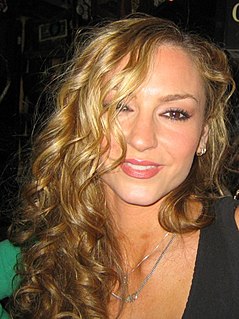A Quote by Bruce Campbell
I prefer a much looser style. Any time a writer thinks he has all the answers to how someone should talk or react or end a scene, it's a spontaneity - killer. I don't get making sure you get every word right in some stupid speech just because a writer sat there and did it.
Related Quotes
It's great to win a few prizes early on. It helps a writer to get noticed and to get some sales. It can also be a pain in the arse because it gets in the way of the quiet, contemplative time every writer needs, but which is particularly important when you are a new writer finding your own voice, and pursuing the things that interest you.
It's not possible to advise a young writer because every young writer is so different. You might say, "Read," but a writer can read too much and be paralyzed. Or, "Don't read, don't think, just write," and the result could be a mountain of drivel. If you're going to be a writer you'll probably take a lot of wrong turns and then one day just end up writing something you have to write, then getting it better and better just because you want it to be better, and even when you get old and think, "There must be something else people do," you won't be able to quit.
I don't believe, in the end, that there is any such thing as no style. Even a very neutral, plain style, one that doesn't use colloquialisms, lyrical flourishes, heavy supplies of metaphor, etc., is a style, and it becomes a writer's characteristic style just as much as a thicker, richer deployment of idiom and vocabulary.
Every sentence has a truth waiting at the end of it and the writer learns how to know it when he finally gets there. On one level this truth is the swing of the sentence, the beat and poise, but down deeper it's the integrity of the writer as he matches with the language. I've always seen myself in sentences. I begin to recognize myself, word by word, as I work through a sentence. The language of my books has shaped me as a man. There's a moral force in a sentence when it comes out right. It speaks the writer's will to live.
I say "on principle" [regarding 'lesbian writer'] because whenever you get one of your minority labels applied, like "Irish Writer," "Canadian Writer," "Woman Writer," "Lesbian Writer" - any of those categories - you always slightly wince because you're afraid that people will think that means you're only going to write about Canada or Ireland, you know.
One of the most useful parts of my education as a writer was the practice of reading a writer straight through - every book the writer published, in chronological order, to see how the writer changed over time, and to see how the writer's idea of his or her project changed over time, and to see all the writer tried and accomplished or failed to accomplish.
It's akin to style, what I'm talking about, but it isn't style alone. It is the writer's particular and unmistakable signature on everything he writes. It is his world and no other. This is one of the things that distinguishes one writer from another. Not talent. There's plenty of that around. But a writer who has some special way of looking at things and who gives artistic expression to that way of looking: that writer may be around for a time.
Rewriting isn't just about dialogue, it's the order of the scenes, how you finish a scene, how you get into a scene. All these final decisions are best made when you're there, watching. It's really enjoyable, but you've got to be there at the director's invitation. You can't just barge in and say, "I'm the writer."
I'm not a good writer, and I don't care. Unfortunately, after I left college, I didn't have time much for literature. I wish I did. Most of the time I read documents, and that's not going to help your writing. But I'm a very logical writer, and you can't get out of me. Once I've nailed you, you're finished.
I can't define myself as a political writer - I don't think I've earned it, and I don't function as a political writer in the way that many of the writers I admire do. It's not simply a question of context, of where I'm writing from - there is much in American society that urgently needs to be written about. I think your work is always engaged with politics in the looser sense of the word - and that looseness is itself a kind of privilege - because politics and culture are evidently intertwined.
The visual stuff just lives inside of you. As far as really being able to take care of an actor on a set, how to talk to an actor, and how to get what you need out of a scene is probably where I might know a thing or two. Although, in TV, the actors are pretty much left alone. It's really the writer's medium more than anything.



































